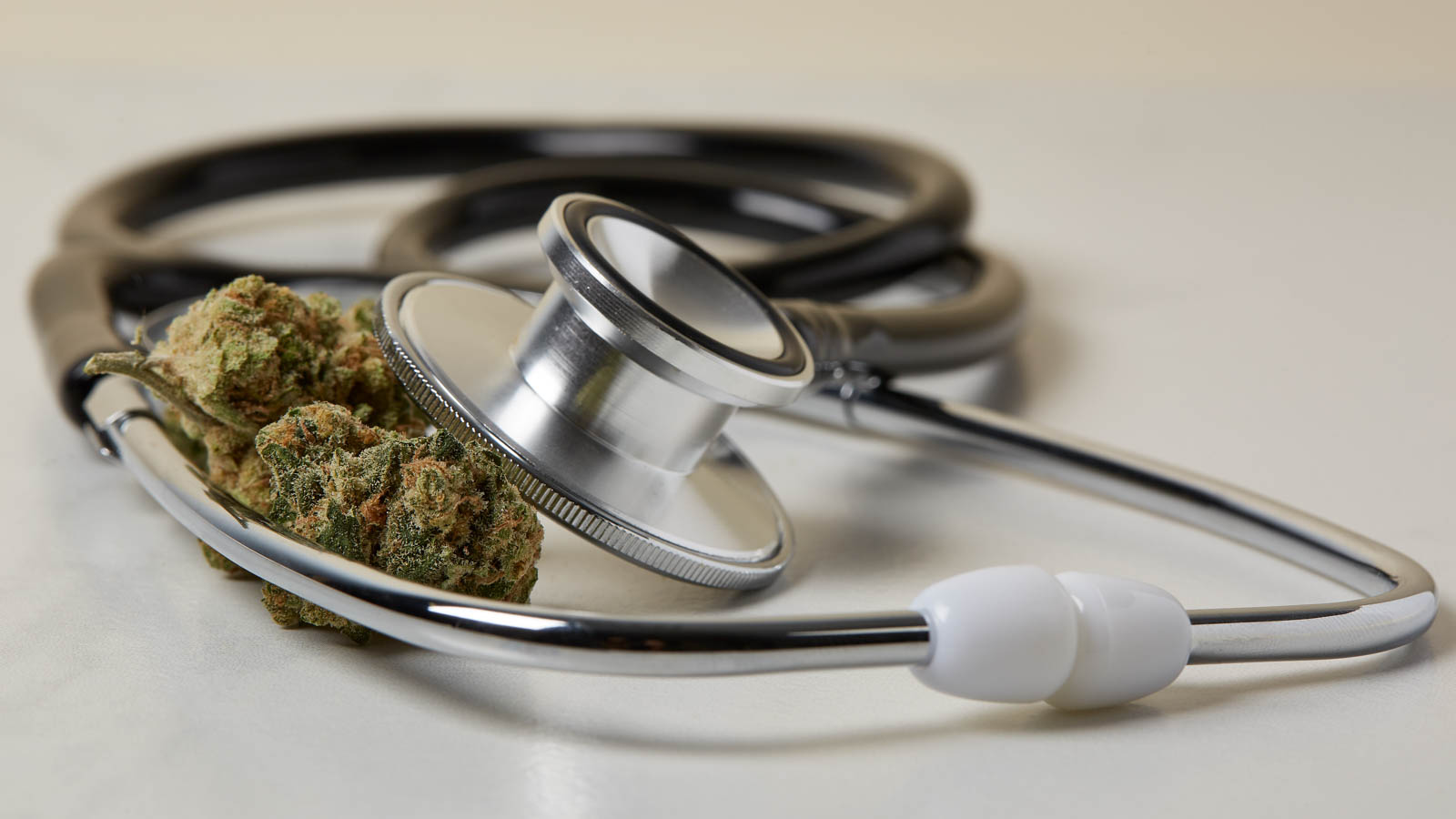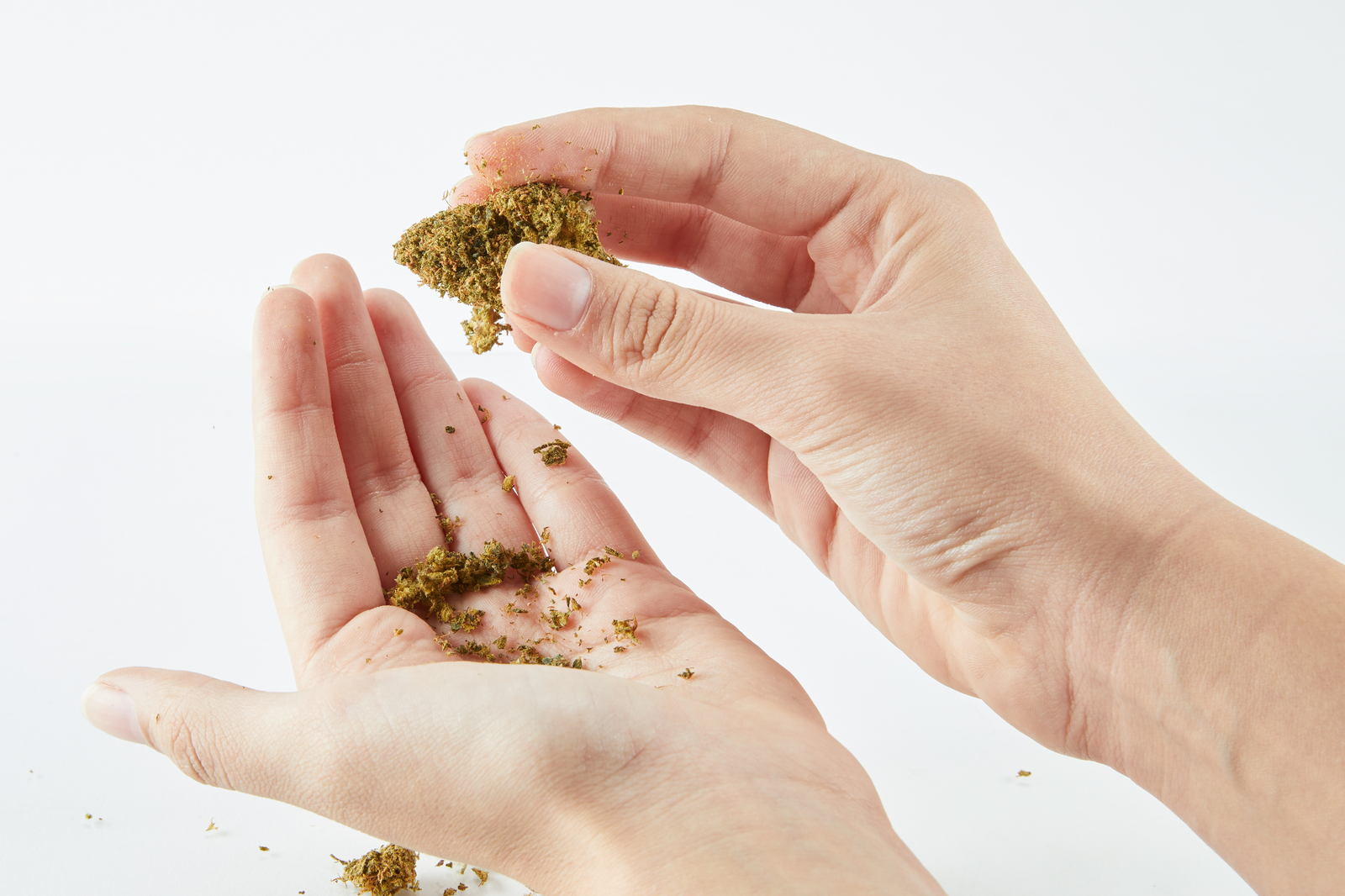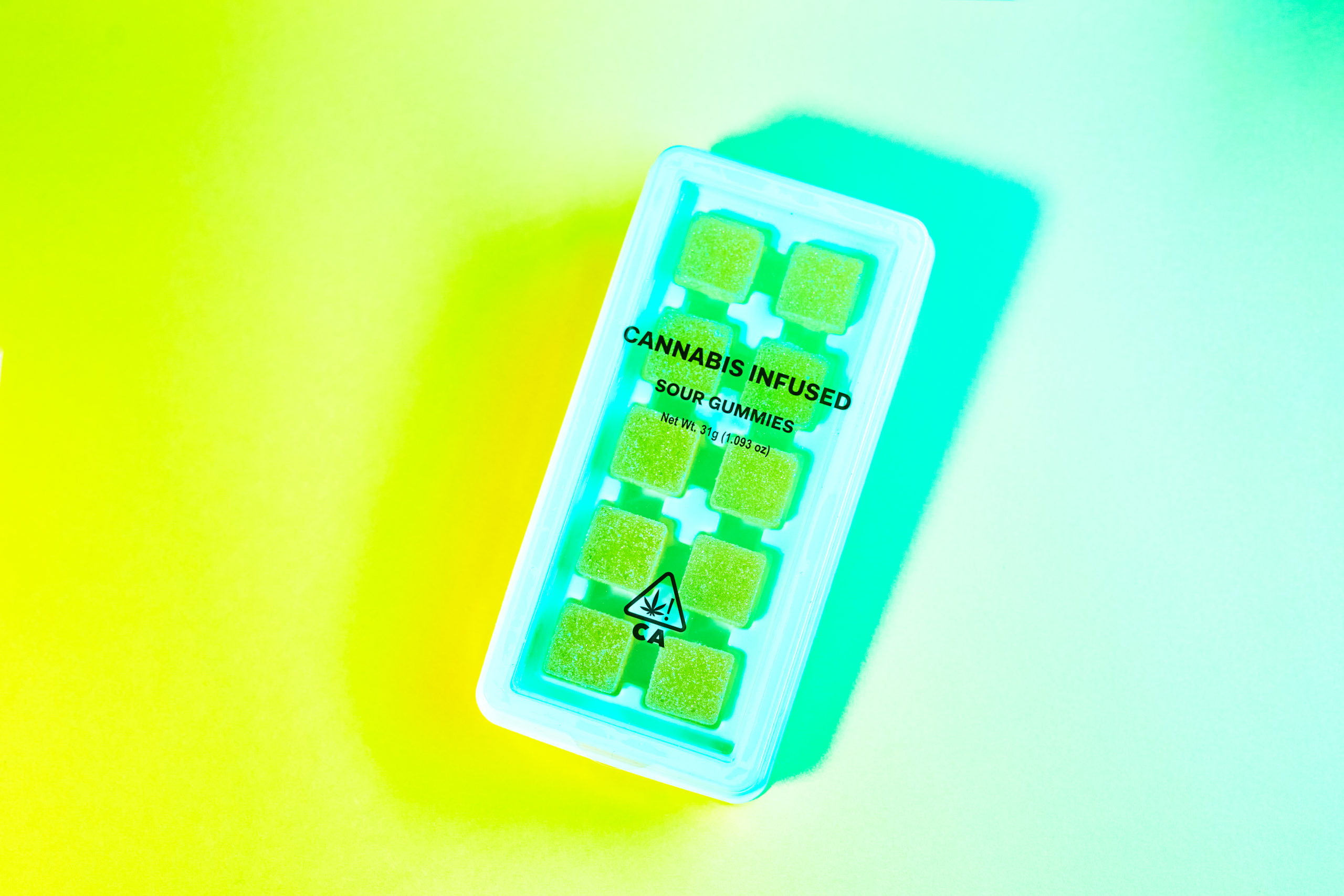June is Post-Traumatic Stress Disorder Awareness Month, and many scientific studies are reporting that the use of cannabis may help improve health-related quality of life. It may also lead to other significant benefits for individuals suffering from this condition.
What is PTSD?
PTSD is a debilitating condition that can occur in people who witness or experience an extremely stressful traumatic event, series of events, or difficult set of circumstances. These events cause an experience that is emotionally and/or physically harmful or life-threatening. As a result, people can endure ongoing mental, emotional, and physical difficulties.
Physiologically, PTSD arises from an impairment in fear extinction, with pervasive memories of an aversive experience that continues to trigger a fear response long after the actual event occurred. It has been reported that 7% of veterans will suffer PTSD symptoms in their lifetime. However, veterans of the Iraq and Afghanistan wars are affected by PTSD at a higher estimated rate of 11 - 20%. Estimates of PTSD for Vietnam veterans are even higher.
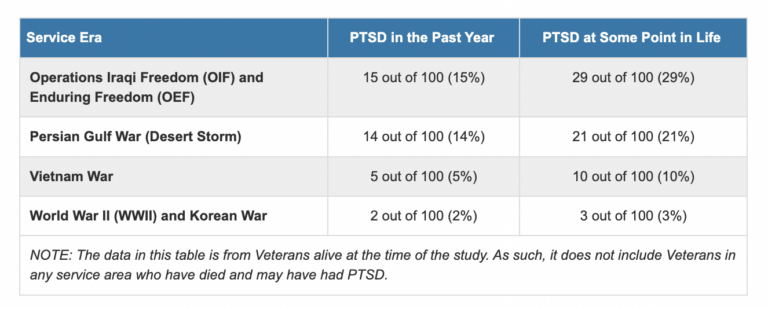 Photo by: via ptsd.va.gov
Photo by: via ptsd.va.govImage lightbox

In the past, terms like “shell shock” and “combat fatigue” were used to describe PTSD that occurred in military veterans returning from World War I and II. But more recently, we understand that other traumatizing events, such as natural disasters, serious accidents, physical or sexual assaults, domestic violence, and bullying, may result in PTSD as well.
PTSD can occur in anyone of any age. Approximately 3.6% of all adults in the US have been diagnosed with PTSD, with a higher prevalence in women (5.2%) and teenagers (8%). It has been estimated that one in 11 people will be diagnosed with PTSD sometime in their lifetime. Although many people experience traumatic events, only 8 - 12% will go on to develop PTSD. Evidence of multiple genetic components for PTSD has been found with reports of gene overlap with the diagnosis of major depressive disorder.
What are the symptoms of PTSD?
There are four categories of symptoms in PTSD:
- Intrusive thoughts: repeated, involuntary memories, nightmares, and flashbacks
- Avoidance: avoiding reminders such as people, places, and situations that trigger distressing memories, as well as resistance to talking about the event and feelings experienced
- Alterations in cognition and mood: distorted thoughts about the cause or consequences of the event; ongoing fear, horror, anger, guilt, or shame; feeling detached or estranged from others; and inability to feel happiness or satisfaction
- Alterations in arousal and reactivity: irritability, angry outbursts, behaving in a self-destructive way, easily startled, and difficulty sleeping or concentrating
How is PTSD treated?
There are many types of treatments for PTSD, although no one treatment has been proven beneficial for all who struggle with symptoms.
 Photo by: Gina Coleman/Weedmaps
Photo by: Gina Coleman/WeedmapsImage lightbox

Pharmaceutical medications, such as antidepressants, anti-anxiety medications, and antipsychotics, are often utilized as a first-line treatment. However, many of these medications may cause significant side effects — especially when taken in combination — and have been shown to have limited efficacy.
Cognitive behavioral therapies, like prolonged exposure therapy and cognitive processing therapy, are often recommended for PTSD. An emerging treatment called magnetic resonance therapy is also being utilized to reduce symptoms. It is a variation of transcranial magnetic stimulation, using the patient's brain waves and resting heart rate to guide brain stimulation.
Another treatment modality, called stellate ganglion block, is a procedure that involves the injection of local anesthetic in and around the stellate ganglion (located at the base of the neck) to temporarily block its function. One study documented a clinically significant reduction in PTSD symptoms at eight weeks after two treatments.
More recently, other alternative therapies have been investigated for their benefits in PTSD treatment:
- Lycopene is a natural carotenoid antioxidant found in many fruits and vegetables. A 2020 study found that lycopene treatment can improve PTSD-like behaviors in mice due to its anti-neuroinflammatory and anti-oxidative stress properties.
- Psilocybin is a naturally occurring psychedelic compound found in certain species of mushrooms, often referred to as "magic mushrooms." It is known for its psychoactive properties, which can induce alterations in perception, mood, and cognition. Psilocybin may reduce PTSD symptoms through promotion of neuroplasticity and serotonin receptor activation.
- MDMA (3,4-methylenedioxymethamphetamine) is a synthetic psychoactive drug known for its stimulant and hallucinogenic properties. It is recreationally referred to as "ecstasy" or "molly." Clinical trials have shown that MDMA-assisted therapy can lead to significant reductions in PTSD symptoms, sometimes with long-lasting effects. Patients often report decreased anxiety, fewer intrusive memories, and improved mood.
- Other treatments that may be effective include acupuncture, mantram repetition (a specific type of meditative practice), and yoga.
PTSD and the endocannabinoid system
Abnormalities in the endocannabinoid system have been described in individuals with PTSD, namely an increase in type 1 cannabinoid receptors, reduced endocannabinoid levels, and lower cortisol levels.
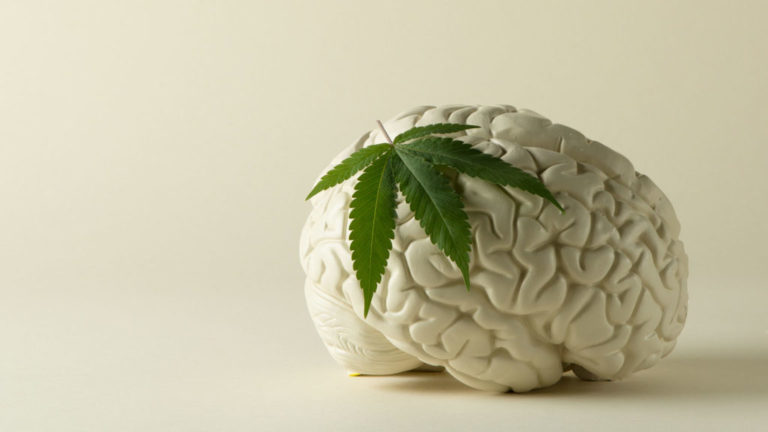 Photo by: Gina Coleman/Weedmaps
Photo by: Gina Coleman/WeedmapsImage lightbox

The presence of all three abnormalities correctly classified nearly 85% of PTSD cases. Since cannabis interacts profoundly with the endocannabinoid system, it can address some of the fundamental chemical imbalances associated with PTSD, providing relief and promoting homeostasis.
What does the research show about cannabis and PTSD?
Over the past two decades, numerous investigative studies have documented the benefits of cannabis therapy for PTSD. Here are some of the evidence-based highlights from the scientific literature:
- 2009: Nabilone, a synthetic cannabinoid that mimics THC, was found to either eliminate nightmares or significantly reduce nightmares in 72% of PTSD patients who did not respond to conventional treatment. Participants reported improved quality of sleep and a reduction of daytime flashbacks. When nabilone was discontinued, nightmares returned, resolving again when the drug was restarted.
- 2014: In a Canadian study, nabilone given to prison inmates with PTSD showed efficacy with significant improvement in insomnia, nightmares, and other PTSD symptoms, and the Global Assessment of Functioning test. A number of participants were able to discontinue antipsychotic and/or sedative/hypnotic medications, reducing unwanted side effects.
- 2014: PTSD patients who were approved to use medical cannabis as part of the New Mexico Medical Cannabis Program reported over 75% reduction in symptoms with cannabis use.
- 2014: In a study from Israel, ten patients with chronic PTSD who were given a 5-milligram dose of THC twice a day in an oral form showed a statistically significant improvement in global symptom severity, sleep quality, frequency of nightmares, and PTSD hyperarousal symptoms.
- 2019: In a retrospective study of 11 patients with PTSD who received CBD for eight weeks, 91% reported a decrease in symptom severity, with less anxiety, better sleep, and improved focus. CBD also relieved nightmares in a subset of these patients experiencing this symptom. CBD was well tolerated, and no patients discontinued treatment. Four patients continued on CBD for 36 weeks, and all experienced long-term, sustained decreases in the severity of their PTSD symptoms.
- 2022: A report from the UK assessed clinical outcomes in 162 individuals with PTSD from the UK Medical Cannabis Registry using validated patient reports. Across all follow-up periods, statistically significant improvements were observed in the common PTSD symptoms of intrusion, avoidance, and hyperarousal. Additionally, health-related quality of life, sleep, and anxiety significantly improved. Although some adverse effects were reported, all were considered minimal in severity.
- 2023: An Australian study reported significantly improved anxiety, depression, fatigue, and social abilities in people living with PTSD who used a CBD-dominant formulation (about 11:1 CBD:THC ratio) for a mean of about five months.
Cannabis as a treatment: Patient testimonial
John is a 73-year-old Vietnam veteran who has been using cannabis for over 30 years to manage his PTSD. He reported that he used cannabis while fighting in Vietnam to deal with the stress but had decided to stop once he was out of the military. After years of struggling with nightmares, difficulty being in crowds, overwhelming anxiety, and alcohol abuse, he sought care at the VA.
“My family pushed me to get help. The VA offered me every pill they had, and none of them helped,” he said. “I was a mess until one of my military brothers gave me weed.” John shared that he stopped drinking once he started cannabis again, and he reported that his nightmares disappeared—he began sleeping better, and he was happier.
 Photo by: Gina Coleman/Weedmaps
Photo by: Gina Coleman/WeedmapsImage lightbox

John stated, “I knew I had to find something to help me, or I wouldn't be here for much longer. I broke the law to use weed back in the day, but now it's legal, and it really made a big difference for me.” Recently, John started taking CBD gummies to help with arthritis pain. He reported that it helps with the pain, but he thinks it has also helped with his anxiety as well.
Patrick, a 33-year-old veteran of the war in Afghanistan, shared that his symptoms of PTSD are difficulty with sleep, dealing with anger, and being in large crowds. He states, “There are two things that have helped me the most in transitioning from military to civilian life: motorcycles and weed. Riding my motorcycle requires 100% of my focus to stay upright on two wheels. This forces me to put aside whatever else I'm feeling that day, which allows my brain to reset. Weed does the same thing for me but in a different way. It pushes back 'intrusive thoughts' and resets my cognition and mood. I see motorcycles and weed as tools that give me peace of mind."
As a cannabis physician who has treated many people with PTSD, I encourage patients to try different cannabinoids, including THC, CBD, and CBG, as all of these compounds have been shown to help with anxiety.
I encourage my patients who use THC exclusively to include CBD and CBG in their cannabis regimen as both of these compounds synergize with THC to help reduce symptoms of anxiety and, additionally, help prevent tolerance to THC, which can result in a loss of medicinal benefits and result in worsening symptoms.
If you or someone you know is struggling with mental health, there are many resources available for help:
- 988 Suicide & Crisis Lifeline: Call or text 988, or chat online with a trained crisis counselor 24 hours a day, seven days a week for confidential support. You can also text "Q" to 988 or call 988 and press "3" to reach an LGBTQI+ affirming counselor.
- FindSupport.gov: Learn how to get support for mental health, drug, and alcohol issues.
- FindTreatment.gov: Locate treatment facilities or providers, or call SAMHSA's National Helpline at (800) 662-HELP (4357)
FAQ
How does cannabis help PTSD?
Cannabis works with the body's endocannabinoid system. By addressing some of the root-cause imbalances that create PTSD symptoms, cannabinoid compounds can alleviate some of the most difficult challenges of this condition.
What are the best cannabis strains for PTSD?
Many find relief with strains that contain the terpenes myrcene and linalool, as they tend to promote less anxiety and better sleep. Examples include Grand Daddy Purple and OG Kush. Strains that contain both THC and CBD, like Cannatonic, Harlequin, and AC/DC, are also excellent choices for combating symptoms of PTSD, as the addition of CBD can level out the more potent effects of THC.
Some also report that the terpene pinene, which is found in Blue Dream, is helpful. However, others have said it can be overstimulating, so pay attention to which terpenes are best for your body. Strains with THCV have also been reported to be helpful, with Doug's Varin, Durban Poison, Pineapple Purps, and Malawi Gold leading the way.
If you're in the beginning stages of finding the right strain to suit your specific needs, consider tracking your cannabis use in a guided journal or cannabis log book.
How effective is medical cannabis in treating PTSD?
Based on research and anecdotal reports, as well as its proven safety profile, cannabis can be effective in reducing the challenging symptoms of PTSD. Some report relief from nightmares, anxiety, pain, and other symptoms.
This article was written by Bonni Goldstein, MD, a physician specializing in cannabis medicine in Los Angeles, California, owner and medical director of CannaCenters, and medical advisor to Weedmaps.com.

